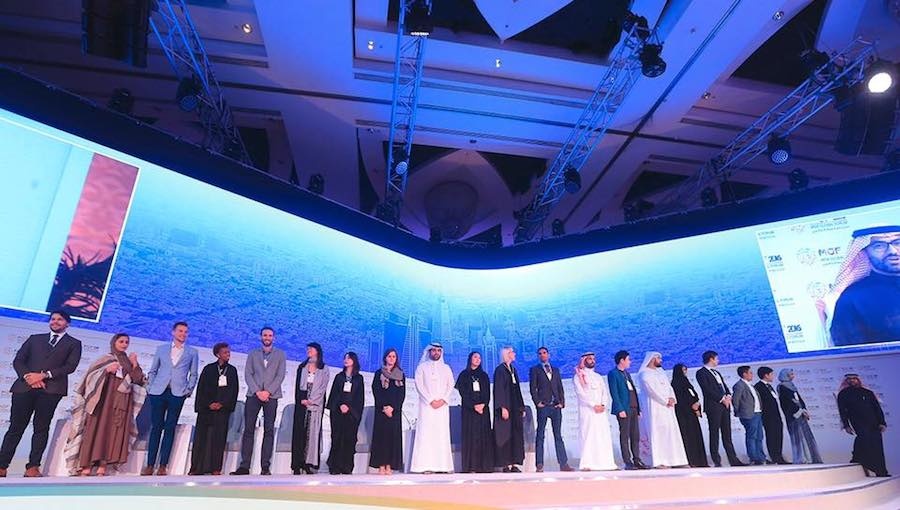8 things we learned about Saudi at the Misk Global Forum

Outside the world of oil, Saudi Arabia is putting itself on the map.
Currently 70 percent of the Saudi population is under the age of 30, and at last week’s Misk Global Forum (MGF 2016) this was a statistic frequently mentioned.
With the aim of challenging cultural habits, traditional practices and sensitive topics, the government supported event looked to engage Saudi youth and encourage them to dip their toes into new technologies, sustainable development, innovation and entrepreneurship in Saudi.
For two days Riyadh hosted a slew of regional and global tech leaders, decision makers and young entrepreneurs who took to stages and panels.
“Saudi Arabia will probably become one of our main markets in the region moving forward,” said Hasan Haider, venture partner at 500 Startups during a chat with Wamda.
Indeed, there has been a lot of movement on the Saudi investments scene this year, like the Uber investment and Japan’s Softbank deal. “This country is probably aiming at becoming the leading market in the region, and with such events it is trying to put its feet on the ground,” added Haider.

An open floor
Designed as a hub and more than just an event, Misk proved to be effective and beneficial for local entrepreneurs first. “For the first time I can interact with decision makers and Saudi youth at the same time,” said Saudi social entrepreneur, Lujain Al-Ubaid, cofounder and CEO of Tasamy.
She added that the interactive nature of the event meant it was both serious and beneficial, whether through networking or listening to speakers.
Topics at the top of the agenda included education, culture, funding and government support. Here are eight things attendants had to say about Saudi’s young ecosystem.
There is a lot of optimism when it comes to Vision 2030 but now is the time to focus on execution. The startup community in KSA is not large enough, Vision 2030 should look into that more and support grow the community in order to successfully execute on the Vision.Three tips for Saudi entrepreneurs: Draw a clear vision, learn how to reward failure and have no fear of change, believe you can change your startup, your company, your country, and even the world - John T. Chambers, executive chairman of Cisco.
The Kingdom needs the youth to re-create jobs, rather than trying to fit in current ones. Encourage your children to think of the solutions they want to work on when they grow up, not what they want to work in - Mounira Jamjoom, CEO of the Emkan education platform, KSA.
The Saudi ecosystem is growing in a direction that gives tech and women entrepreneurs the opportunity to make a change in our societies, by becoming more involved in matters previously considered as part of the ‘grownups’ field only - Aljawhara Mohammed Alqahtani, cofounder and head of the repair department at Fixtag, KSA.

The government supporting such events, means a lot to the entrepreneurial Saudi ecosystem. In a society where employment is considered the only option for university graduates, there is a shift towards the entrepreneurial mentality - Abdulaziz Fahad Al Jouf, founder and CEO of Pay tabs Co, KSA.
The Saudi ecosystem needs to make sure the right capital and resources are channelled into entrepreneurship. The private sector and the government are being very progressive in wanting to be part of the next big thing. Such events contribute into getting the right momentum for the Saudi market which will allow youth to channel their efforts automatically and naturally into businesses that materialize on the ground - Zeid Hreish. general manager of Uber KSA.
This country needs entrepreneurs to take action themselves, it needs young people’s mindset and spirit to make Vision 2030 a reality. 90 to 95 percent of startups will fail, but the 10 percent who will succeed will change the region if not the world - Joe Kaeser, president and CEO of Siemens.
There is a lot of energy to channel into positive directions, and local and regional governments are responding. Young Saudis want a chance at self determination in the future, they want to be able to impact their own future somehow instead of feeling that they have no control over their destiny. Given a chance to work hard, they’ll do some great stuff - Ahmed Alfi, founder and chairman of Sawari Ventures.
KSA needs to diversify the way technology is introduced into spurring more innovation among its youth. The education system is not an exception to disruption as it was built hundreds of years ago. The future will be very different. Education will be lifelong, and we will be able to democratize education and adapt our learning to our own pace. The key of education is to unslave our students from ‘teachers dictators’, and let them follow their own pace - Sebastian Thrun, founder, chairman, and president of Udacity, USA.


